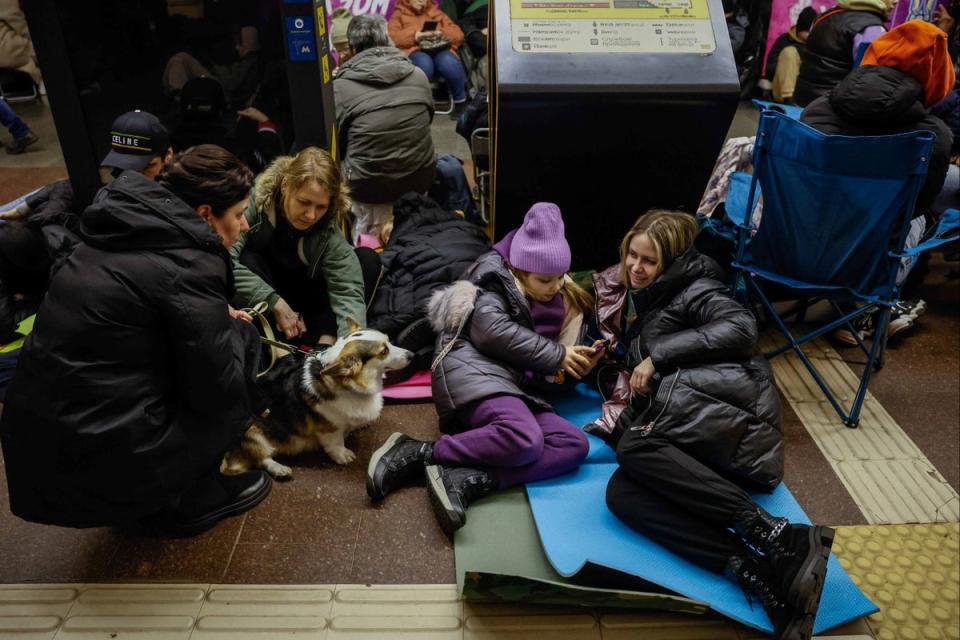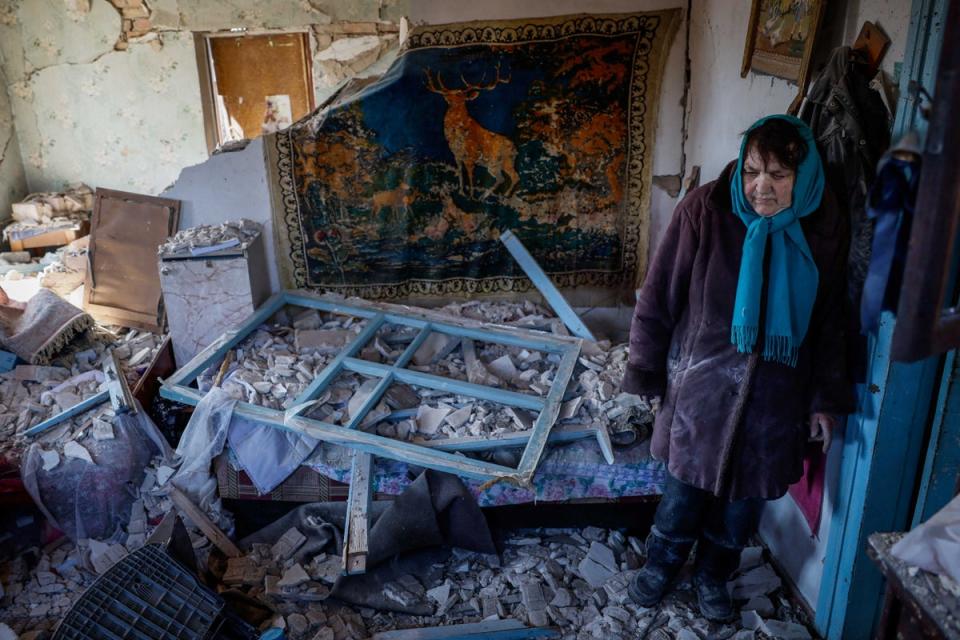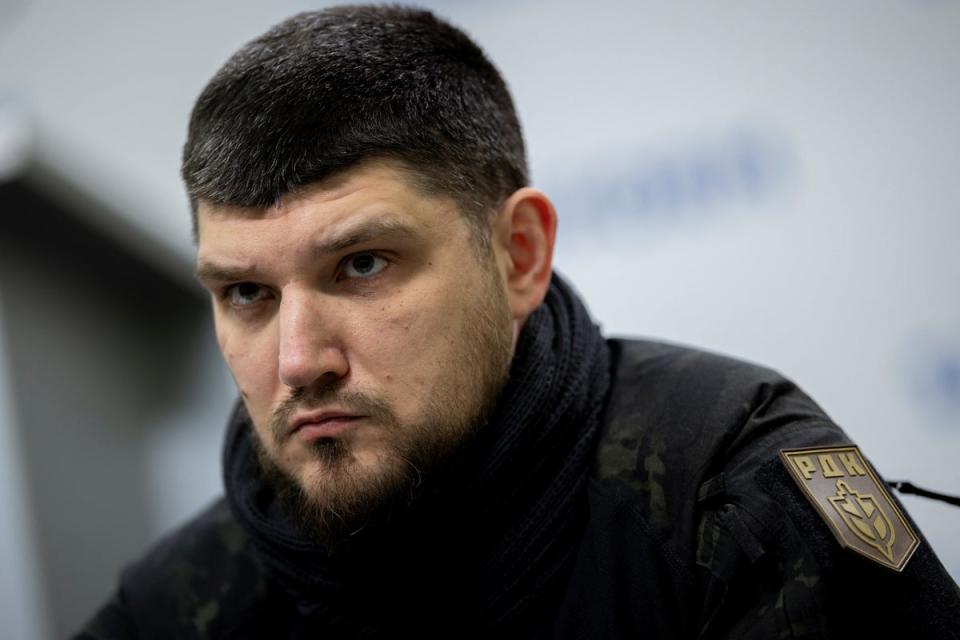Ukraine shoots down dozens of Russian missiles to foil largest attack on Kyiv in weeks

- Oops!Something went wrong.Please try again later.
Ukraine has foiled Russia’s largest attack on Kyiv in weeks – with the country’s air force saying all 31 missiles used in the assault were shot down.
The ballistic and cruise missiles, the first fired on the Ukrainian capital in 44 days, were knocked out of the sky, but at least 17 people were injured in Kyiv and the surrounding area by falling debris. Schools, residential buildings and industrial facilities were also damaged, Ukrainian officials said.
Russian president Vladimir Putin had threatened to “respond in kind” to Ukrainian aerial attacks in recent days on Russia’s Belgorod region near the border with Ukraine. The assaults have been an embarrassment for the Kremlin. On Thursday, five people were injured in the latest attack, which damaged homes and the city’s sports stadium, local governor Vyacheslav Gladkov said. Russia’s ministry of defence said it had intercepted 10 rockets over the region.
In the wake of the missile bombardment of Kyiv, Ukrainian president Volodymyr Zelensky called on his Western allies to provide more air defences to Ukraine. Kyiv has better air defences than most regions, meaning the missile interception rate is frequently high.
“Every day and every night there is such terror. The world’s unity can stop it when it helps us with air defence systems. Now we need this defence here in Ukraine,” Mr Zelensky said on the Telegram messaging app.
City and regional officials said at least 13 people had been injured in different parts of Kyiv, and four more in the surrounding area. An 11-year-old girl was among four people taken to hospital, city officials said. According to the Ukrainian military, Russia has launched more than 8,000 missiles since Mr Putin launched his invasion two years ago.

Kyiv was under air raid warnings for around three hours on Thursday morning, with Ukrainian officials saying that air raid sirens have sounded more than 1,000 times since the start of the war.
“We feel hatred, terrible hatred. This is not fear, this is hatred. Towards Russia generally, and everyone there in particular,” Kostyantyn, a Kyiv resident, told reporters, standing outside a damaged residential house with his wife.
His wife Alisa added: “I send greetings to my parents in Crimea who voted [in Russia’s recent presidential election]. They went to the elections and voted for Putin. Mum, and Dad, thank you very much that my husband and I were almost killed today. Thank you.”
Russia’s military used strategic bombers and also launched some missiles from Russian territory, according to Serhiy Popko, the head of Kyiv’s military administration. The missiles targeted Kyiv from different directions, he added. Falling wreckage from the intercepted missiles set fire to at least one apartment building, burned parked cars, and left craters in streets and a small park. Some streets were littered with debris, including glass from shattered windows.

Raisa Kozenko, a 71-year-old woman whose apartment lost its doors and windows in the blast, said her son jumped out of bed just in time.
“He was covered in blood, in the rubble,” she told reporters, trembling from shock. “And all I can say is ... the apartment is completely destroyed.”
Mariia Margulis, 31, said a decision to stay in the corridor throughout the attack saved her family. “The blast wave blew out all the windows on the side where everything happened,” she said. “My mom was supposed to sleep in that room, but I asked her to move to the corridor in time, which saved us.”
The strike came hours before EU leaders met up in Brussels for a summit. The European Commission, the EU’s executive body, has proposed taking profits from Russian assets frozen in Europe after Moscow’s invasion and transferring 90 per cent to an EU-run fund that can be used to finance arms for Kyiv. It is estimated that the profits could amount to around £2bn a year.

Meanwhile, three Ukrainian-backed paramilitary groups that include Russians opposed to the Kremlin said on Thursday that their forces were continuing their cross-border attacks following a week of raids. The groups launched incursions from northern Ukraine last week into the Russian regions of Kursk and Belgorod, claiming to have entered several villages on the Russian side of the border.
“The operation, even right now, is continuing. We will talk about our losses after its conclusion,” Denis Kapustin, the leader of one of the groups – the hard-right Russian Volunteer Corps – told a press conference in response to a question about the unit’s losses.
The other two groups at the press conference in central Kyiv were the Freedom of Russia Legion and the Siberia Battalion, which says it is comprised of indigenous groups from Russian territory.
They said they receive intelligence and logistics support from the Ukrainian armed forces, but repeated their assertion that they are acting independently of Kyiv when fighting on Russian territory. Mr Kapustin said Ukraine provides ammunition and medical evacuation for his fighters. The Anti-Defamation League, a US extremism watchdog group, has said Mr Kapustin is far-right, though Mr Kapustin denies this and says that he and his unit hold conservative and traditionalist views.
However, asked about the provenance of the unit’s weapons, Mr Kapustin smiled and said that one could buy tanks and rocket-launcher systems in a military surplus shop. He appeared to be making reference to similar comments made by Mr Putin in 2014 when he dismissed a question about the Russian military’s involvement in the illegal seizure of Crimea from Ukraine. Mr Putin suggested at the time that those occupying Crimea, which Russia still holds, were spontaneous groups who could have acquired their uniforms from army surplus stores.
Alexei Baranovsky, the spokesperson for the Freedom of Russia Legion, said that in its raids outside Ukraine, his unit used trophy weapons captured from Russia.
Reuters and Associated Press contributed to this report

